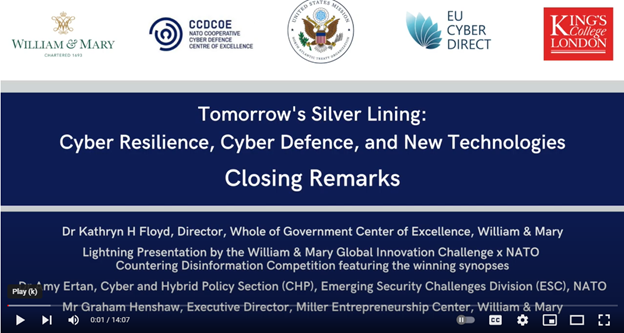Young Leaders
Watch the WMGIC x NATO Remarks
Vital to any conversation on tomorrow and cyber resilience is the next generation. Today’s youth have been raised in this new world filled with ever evolving technology, security, and new challenges. This conference had three youth components.
First, young leaders ages 18 to 35 were fully involved participants in all portions.
Second, Closing Ceremonies included a report-out by undergraduate students Terra Stearns and Kiran Rachamallu from the 21 October 2022 virtual W&M Global Innovation Challenge (WMGIC) x NATO Headquarters Countering Disinformation Competition. During the competition, more than 400 students across NATO Member and Partner Nations pitched solutions to one of seven topics: Russia-Ukraine War, Public Health, Climate Change: Clean Energy, Climate Change: Climate Security, Artificial Intelligence, Gender-Based Violence, or Terrorism. Through the WMGIC x NATO HQ competition, participants and their solutions have been and will continue to be heard by practitioners and professionals around the world, including NATO leadership, with the promise of inspiring concrete action. Considering today’s undergraduates' intense familiarity and upbringing in the digital world, there is no group better equipped to lead us in securing our information streams. The mind’s of the competition participants combined with WMGIC’s method extends a strong interdisciplinary approach to cyber resilience, cyber defence, and new technologies. This strength was seen in the WMGIC x NATO HQ competition, and will continue to be evident in the coming years as today’s youth become tomorrow’s leaders.
Third, the afternoon was devoted to a special “Design Thinking and Entrepreneurial Approaches to Cyber Defence” workshop reserved exclusively for youth engagement and lead by:
- Dr Amy Ertan, Cyber and Hybrid Policy Section (CHP), Emerging Security Challenges Division (ESC), NATO [Facilitator]
- Mr Graham Henshaw, Executive Director, Miller Entrepreneurship Center, William & Mary [Facilitator]
- Dr Anthony Stefanidis, Professor of Computer Science, William & Mary [Facilitator]















